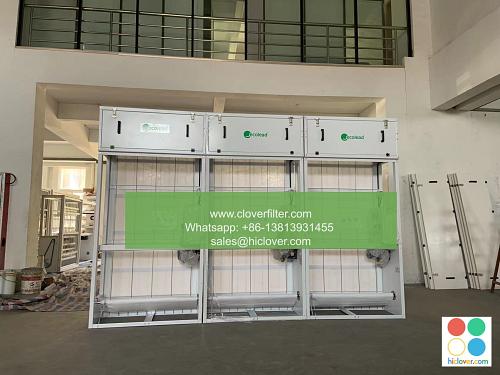Automatic Roll Air Filters in Pharmaceutical Cleanrooms: A Review of the Latest Technologies

Pharmaceutical cleanrooms are highly controlled environments that require precise temperature, humidity, and air quality control to ensure the quality and safety of pharmaceutical products. One of the critical components in maintaining the air quality in these cleanrooms is the air filtration system. Automatic roll air filters are a type of air filtration system that has gained popularity in recent years due to their high efficiency, low maintenance, and cost-effectiveness. In this article, we will review the latest technologies in automatic roll air filters and their applications in pharmaceutical cleanrooms.
Automatic roll air filters are designed to provide a continuous supply of filtered air to the cleanroom. They consist of a roll of filter media that is automatically advanced as the filter becomes dirty, ensuring that the air quality is maintained at a consistent level. These filters are typically equipped with a pre-filter and a HEPA filter, which work together to remove particles and contaminants from the air. The pre-filter captures larger particles, while the HEPA filter captures smaller particles, including bacteria, viruses, and other microorganisms.
The latest technologies in automatic roll air filters include advanced materials and designs that improve their efficiency and effectiveness. For example, some filters use nano-fiber technology, which provides a higher level of filtration efficiency and a longer filter life. Others use advanced frame designs that reduce the risk of filter bypass and improve the overall performance of the filter. Additionally, some automatic roll air filters are equipped with sensors and monitoring systems that provide real-time data on the filter’s performance and alert maintenance personnel when the filter needs to be replaced or maintained.
Automatic roll air filters have several benefits in pharmaceutical cleanrooms. They provide a high level of air quality control, which is critical in preventing contamination and ensuring the quality of pharmaceutical products. They are also low maintenance, as they do not require frequent filter changes or cleaning. This reduces the risk of human error and saves time and resources. Furthermore, automatic roll air filters are cost-effective, as they reduce the need for expensive filter replacements and maintenance.
In addition to their technical benefits, automatic roll air filters also have several practical advantages. They are easy to install and integrate into existing air handling systems, and they can be customized to meet the specific needs of each cleanroom. They are also compact and space-efficient, making them ideal for use in small or modular cleanrooms. Moreover, automatic roll air filters are designed to be flexible and adaptable, allowing them to be used in a variety of applications, including pharmaceutical manufacturing, biotechnology, and medical device manufacturing.
Despite their many benefits, automatic roll air filters also have some limitations and challenges. For example, they require regular maintenance to ensure that they continue to function effectively. This includes monitoring the filter’s performance, replacing the filter media as needed, and ensuring that the filter is properly installed and integrated into the air handling system. Additionally, automatic roll air filters may not be suitable for all types of cleanrooms, particularly those that require very high levels of air quality control or specialized filtration systems.
In conclusion, automatic roll air filters are a critical component in pharmaceutical cleanrooms, providing a high level of air quality control and low maintenance. The latest technologies in automatic roll air filters include advanced materials and designs that improve their efficiency and effectiveness. While they have several benefits and advantages, they also require regular maintenance and may not be suitable for all types of cleanrooms. By understanding the benefits and limitations of automatic roll air filters, pharmaceutical manufacturers can make informed decisions about their use and ensure that their cleanrooms meet the highest standards of air quality control.
FAQs
Q: What is an automatic roll air filter?
A: An automatic roll air filter is a type of air filtration system that provides a continuous supply of filtered air to a cleanroom. It consists of a roll of filter media that is automatically advanced as the filter becomes dirty.
Q: What are the benefits of using automatic roll air filters in pharmaceutical cleanrooms?
A: The benefits of using automatic roll air filters in pharmaceutical cleanrooms include high air quality control, low maintenance, and cost-effectiveness. They also provide a high level of filtration efficiency and a long filter life.
Q: What are the limitations of automatic roll air filters?
A: The limitations of automatic roll air filters include the need for regular maintenance, potential incompatibility with certain types of cleanrooms, and the requirement for proper installation and integration into the air handling system.
Q: How do automatic roll air filters work?
A: Automatic roll air filters work by providing a continuous supply of filtered air to the cleanroom. They consist of a roll of filter media that is automatically advanced as the filter becomes dirty, ensuring that the air quality is maintained at a consistent level.
Q: What types of applications are automatic roll air filters suitable for?
A: Automatic roll air filters are suitable for a variety of applications, including pharmaceutical manufacturing, biotechnology, and medical device manufacturing. They are also suitable for use in small or modular cleanrooms.


